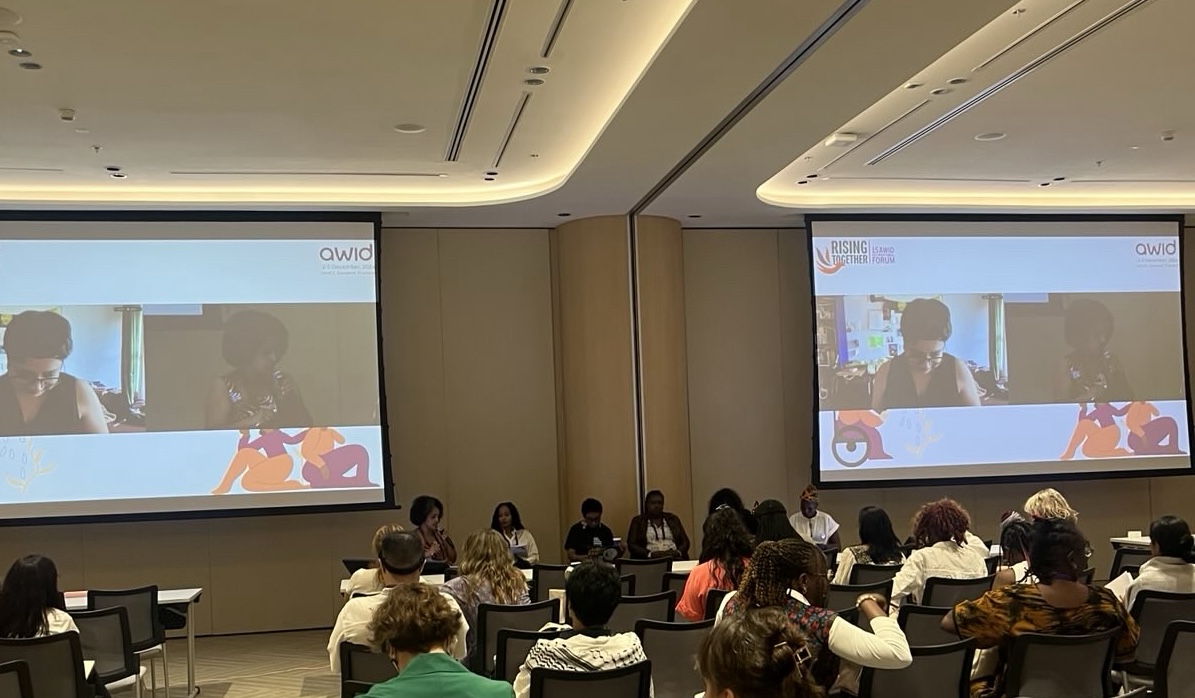Reimagining, broadening and expanding TFGBV and transnational solidarity

In the third cycle of the Feminist Internet Research Network (FIRN), our research focused on technology-facilitated gender-based violence (TFGBV). We collaborated with 10 research partners from the Global South/Global Majority. Each partner examined TFGBV through an intersectional feminist perspective. Concurrently, in multiple international conferences, FIRN has fostered a broader comprehension of the discussions surrounding TFGBV, particularly in the context of global conflicts and genocides.
This brief reflection aims to weave together and account for the insights from panel discussions alongside the theoretical imperatives concerning the necessity of rethinking technology-facilitated violence. This emphasis was notably highlighted during our panel at the AWID International Forum 2024, held in Bangkok, Thailand, where FIRN co-hosted a panel with Rising Flame, titled “Revisiting Transnational Feminist Solidarity and Movement Building in Light of Experiences of Technology-Facilitated Gender-Based Violence (TFGBV) in War and Conflict Zones”. Together with our speakers, we brought together a much-needed conversation that tackles the intersecting social and political issues in Palestine, Sudan, Lebanon, the Democratic Republic of Congo and Ethiopia and their impact on all of us in the Global South, particularly in conflict and war zones. We invited everyone in the room to reflect on our process in identifying violence and how the dominant narrative of TFGBV does not correlate with the magnitude of harm, suffering and oppression experienced by those in conflict zones.
...we brought together a much-needed conversation that tackles the intersecting social and political issues in Palestine, Sudan, Lebanon, the Democratic Republic of Congo and Ethiopia and their impact on all of us in the Global South, particularly in conflict and war zones.
The panel was co-facilitated by Tigist S. Hussen and Srinidhi Raghavan and featured an exceptional line-up of speakers:
1. Weam Shawgi, originally from Sudan and currently residing in East Africa
2. Wala Mohammed, originally from Sudan and currently residing in Kenya
3. Islam al Khatib, a Palestinian refugee born and raised in Lebanon
4. Sunshine Fionah Komusana, Uganda
5. Rebecca Ryakitimbo, Democratic Republic of Congo
Outside of the panel, we also extended the conversation to five other feminists from different Global South regions, who were also participating at AWID, by asking for their reflections on the questions “What does TFGBV look like in the context of war, genocide and conflict zones?” and “How do we practice transnational feminist solidarity in these contexts?” They were:
1. Harira Wakili, Nigeria
2. Lulú V. Barrera, Mexico
3. Prarthana Mitra, India
4. Souad Souilem, Western Sahara
5. Khin, originally from Myanmar and currently residing in the United States
With several ongoing wars, genocides and conflicts, we wanted to expand and deepen our understanding of TFGBV by unveiling the intricate nexus of nationalism, patriarchy and feminist framing of violence, oppression and power. Overall, these collective conversations provide important and critical reflection from the Global South on the limitations of the current framing of TFGBV and emphasise what it truly means to create a feminist internet that empowers even the most vulnerable communities within and beyond borders.
In a volatile and conflict-affected context, where extreme gender- and sexual-based violence are rampant and unaccountable, the current framing of TFGBV needs to be revisited so that it can better recognise and respond to the realities of how these issues manifest in such environments. Panel speakers contextualised the various realities and barriers that exclude women and gender-diverse people from accessing the digital space. Hate and misogynist speech, domestic violence, discriminatory gender norms, power dynamics, poverty, remote geographical locations, war, conflict – all of these have prevented women from participating in digital spaces. In Sudan, the military had weaponised women’s bodies by broadcasting explicit rape videos on social media, revealing the faces of young victim as a tactic to intimidate their families and force them to flee.
Hate and misogynist speech, domestic violence, discriminatory gender norms, power dynamics, poverty, remote geographical locations, war, conflict – all of these have prevented women from participating in digital spaces.
In a one-on-one conversation, Harira Wakili from Nigeria emphasised that most women who are facing gender-based violence, rape and sexual harassment are living in rural areas where there is no connectivity and no access to technology, and this results in severe underreporting. However, this does not imply that they do not experience TFGBV. In a world where everything is hypervisible digitally, the silence of these women’s stories separates them from the rest of the world and from solidarity and resources, and allows violence to grow with impunity. At the same time, discourse and narrative about those living through wars and genocide are depriotitised, silenced, shaped, manipulated and hijacked by nationalist, patriotic and capitalist ideology. In this context, TFGBV manifests itself in the form of extreme silencing, propaganda and gendered disinformation, to legitimise the violence and dehumanise the minorities, and silence those who dissent and speak up.
TFGBV manifests itself in the form of extreme silencing, propaganda and gendered disinformation, to legitimise the violence and dehumanise the minorities, and silence those who dissent and speak up.
In this regard, the panel speakers discussed the distortion and manipulation of discourses in conflict and war zones that legitimise coloniality, the punishment of individuals and collectives deemed "terrorists", the creation of a dehumanising narrative, hate speech, online shaming and trolling, and the shadow banning of the accounts of influential activists who speak up from the ground. In Sudan, feminists who oppose war are labelled as “defeatists” and some have been executed, along with a widespread narrative that promotes a new future without civil society and activists. All these actions are conducted and justified in the name of defending colonial, nationalist, heterosexist and religious ideologies, wherein the chosen religion, ethnicity and gender remain supreme, thus perpetuating the occupation of lands and the destruction of peace and stability both within and outside the country. Many of the panellists noted that activists who oppose war and acts of violence are often targeted. An entire information ecosystem, supported by government entities, media institutions and technology companies, is complicit in this and has profited from oppression. Also implicit in this is the capitalist business model underpinning major tech companies, which profit from facilitating violence and legitimising mass atrocities.
Additionally, a speaker from Uganda mentioned that scapegoating of LGBTQ people is an organised strategy used by authoritarian regimes as a means to drive polarisation towards an inevitable end and to shift public focus away from critical issues by inflaming fear, disgust and anger at the community. In Ethiopia, people have been forcefully outed on social media, and this has led to an onslaught of online and in-person violence against them and their family members. Many have had to flee their homes. The powerful and harmful rhetoric against LGBTQ people desensitises the public and creates a permissive environment for individuals to commit hate and violence against others online and in person.
...scapegoating of LGBTQ people is an organised strategy used by authoritarian regimes as a means to drive polarisation towards an inevitable end and to shift public focus away from critical issues by inflaming fear, disgust and anger at the community
In a separate conversation, Lulú V. Barrera from Mexico emphasised the importance of expanding our understanding of TFGBV to include the violence perpetrated by state actors, often in collusion with corporations, who surveil mothers advocating for their children’s return. The conversation with Prarthana Mitra from India highlighted that TFGBV can occur even without explicit or nude imagery; for instance, a simple selfie or a dancing video may provoke violence if perceived as a deviation from societal norms in Indian communities.
Faced with such intensified patriarchal and democracy crises, the need for and importance of transnational feminist solidarity is more urgent than ever. The panel speakers discussed how the same social media account is a space where they experienced targeted violence and simultaneously facilitated transnational solidarity through mobilising resources and networks. Access to digital technology also comes with the right to freedom of expression, where these women and gender-diverse people find an avenue to speak their truth and connect with the global community. We are constantly overwhelmed with information and content from digital technology; at the same time, there aren’t enough narratives highlighting the oppression and resiliency of women and gender-diverse people in the most vulnerable contexts.
Access to digital technology also comes with the right to freedom of expression, where these women and gender-diverse people find an avenue to speak their truth and connect with the global community.
The panel speakers highlighted that solidarity is often conflated with humanitarian action or acts of charity. Sharing the same sentiment, Souad Souilem from Western Sahara, reflecting on transnational solidarity in her country, believes that solidarity is not an act of charity underpinned by a sense of supremacy over others. Despite one’s well-intentionedness, these acts do not address existing power imbalances and ignore the realities of those affected. This includes the act of sharing sexual violence content, exposing the identity of survivors, and romanticising violence and suffering. Transnational solidarity should be a political position that we take because we believe we can only be free and liberated with the end of imperialism, colonialism, patriarchy, capitalism and racism, and seeing how they are connected to local dictatorship.
...solidarity is not an act of charity underpinned by a sense of supremacy over others. Despite one’s well-intentionedness, these acts do not address existing power imbalances and ignore the realities of those affected
Creating and maintaining transnational feminist solidarity isn’t governed by a strict formula; what we understand today might not hold tomorrow. When asked what Global North feminists can do to show solidarity without perpetrating more harm to the Global Majority, one panellist shared that they can start by decentring themselves, walking away whenever they have the urge to take up space. Khin from Myanmar emphasised that small gestures, like engaging in dialogue with them rather than discussing Myanmar in their absence, can make a difference. True solidarity can begin with open conversations, supporting one another through learning and active listening.
When asked what Global North feminists can do to show solidarity without perpetrating more harm to the Global Majority, one panellist shared that they can start by decentring themselves, walking away whenever they have the urge to take up space.
Panellists stressed the importance of intentionally learning and unlearning and grappling with challenging questions regarding our power dynamics and political beliefs. Transnational solidarity is plural and intersectional, pushing back against the simplistic notion of a universal sisterhood. We must confront the various identities and positionalities that create barriers between us while acknowledging how these divisions are tied to our struggles, allowing this awareness to foster solidarity.
Transnational solidarity is plural and intersectional, pushing back against the simplistic notion of a universal sisterhood.
As the Feminist Internet Research Network advocates for rethinking technology and violence, especially in expanding our understanding of TFGBV, we recognise that genuine change is contingent upon the engagement and courage of our feminist research communities in civil society and academia. These communities must bring attention to technology-facilitated violence that is often sidelined and not yet part of mainstream discourse despite its presence and impact on our daily experiences of understanding violence. Such knowledge-making can help redirect and expand on the "who is accountable?” question by visualising different actors involved in causing harm and destruction regionally and globally. We believe such work will essentially reframe our policy advocacy recommendations to address the crises directly connected to the technological innovations we are witnessing today.
Such knowledge-making can help redirect and expand on the "who is accountable?” question by visualising different actors involved in causing harm and destruction regionally and globally.
